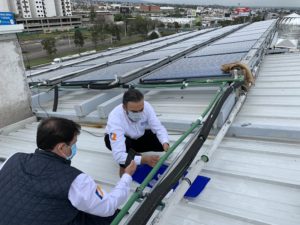Solar hot water system
Most companies are constant working to lower their operation cost. In hotels the water system is always an issue, because a lot of energy is needed here. In locations, where the sun is reliable shining, a solar water heating system is the first choice to produce solar hot water. The thermal energy needed is delivered by the sun for free and the technology is very environmental friendly and sustainable.
There are two major principle of solar water heaters. Either direct solar water heating, means the hot water is produced direct, by passing through the solar panels.
The other option is a two loop system. The water passing through the flat plate collectors is a closed loop. Here the same water is used all the time. A heat exchanger is used to transfer the solar energy from the roof into the open loop. City water or a well feeds the loop, the thermal energy from the hot side of heat exchanger heats the fresh water. Which is then is distributed to all hot water consumers in the hotel.
Our customer – Hotel Domún in Querétaro, Mexico

The Domún is a 4 star business hotel with 132 rooms over 6 floors. On their roof are 24 solar heaters installed. Each heater has 40 tubes, so that a total of 960 tubes are installed.
The hotel has installed a direct system, where the fresh water passes through the panels. The disadvantage of this direct methode, in the case of not so good water quality with a lot of minerals, the lime scale builds incrustations inside the solar collectors. With such incrustations the efficency of the water heating drops. If the hot water no longer reached the desired temperature, the hotel has to clean the solar panels. This was done using 4% hydrochlorid acid. The hydrochlorid removed reliable the incrustation, but as a side effect harmed the tubes of the solar collectors. This acid cleaning was required 3 to 4 times a year. The acid not only removed the encrustations, but also damaged the tubes. This led to a regular replacement of about 70% of the solar tubes. This added up to an annual cost of about 3,500 USD, just for the acid and the new solar tubes. Not including the cost for the labour which performed this maintenance.
Objective:
We agreed to do a trial, to evaluate the efficiency of the Merus rings. First to find out if Merus Rings are able to reduce the amount of encrustations at all. Second if they can reduce, to what extend. As control methode it was agreed to check visual the thickness of the encrustation in the tubes.
We decided for a 2″ HCI Ring at the common feed line which supplies the solar water heating system.
Solar tubes free of lime deposits
30 days after the installation of the Merus ring, the hotel technician observed that 85% of the solar collectors were completely clean. The remaining 15% had a slight film of scale, but he could easy removed with his finger. The water temperature rose in an average of 5 degrees Celsius and the system works non-stop without the need for chemical cleaning or constant replacement of the collector tubes.
The project has a return on investment of less than one year. Merus technology is currently being included in other hydraulic systems of the hotel, such as the cold water network, the hot water recirculation network for the rooms and in the kitchen and bathroom systems.
